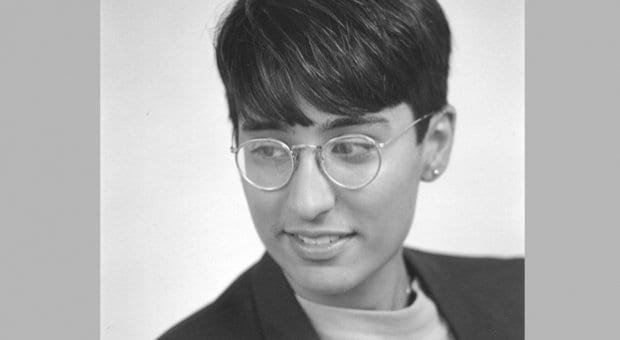I remember vividly that during my time at Capital Xtra I was in transition from the world of politics to the world of journalism. I also remember interrogating myself about why I needed to leave politics for journalism. The answer: because of what I wanted to do with my life — ignite new conversations, lift the lid on taboos and get real about who we are. You can’t do that in politics, but media is a whole different story.
My mission took me to Citytv in Toronto, where I hosted and produced QueerTelevision. Talk about creating new conversations! Probably my proudest moment came when we discovered that half the people watching the show identified as straight.
I loved that because the whole point was to spark discussion across identities. I never wanted QT to be a show for conventional queers. I wanted it to be a space for everyone to find the queer — the misfit, the disrupter, the innovator — within. Which also meant absorbing backlash from those who wanted only rainbow flags.
Funny thing is, the hostility I got from some in the community steeled my spine for the next big challenge: writing my post-9/11 book, The Trouble with Islam Today: A Muslim’s Call for Reform in Her Faith.
In a truly queer twist, angry gays taught me how to engage with angry Muslims. I’ve learned to have fun with my critics, illustrated by this excerpt from my latest book, Allah, Liberty and Love:
“Hello Miss Liberated Feminist Lesbian Irshad. I am an educated Muslim who is moderate and yet I feel you have some fantasies for fame and greed. Here’s a good title for you to think about for your future books: How I Can Fool the West into Thinking that Homosexuality Is Acceptable in Islam. Here is another one: How to Sell Yourself to the Devil.
I will not buy your book! Unless you want to send it free to me. I could use it in my fireplace. PS: My next door neighbours are Lesbians and we respect each other immensely, so try another spin in your rebuttal. – S.R.”
I responded: “Salaams Liberated Neighbor. Thank you for the new book titles. I’ll certainly take them into consideration as I continue racking up my riches and fending off book publishers who want more, more, more from me and my un-Islamic morality.
Thanks, also, for offering to burn my book if I send you a free copy. I’ve thought long and hard about whether to oblige and my decision is … (drum roll, please) … Nah. You see, I’m just too greedy to give you a freebie. Why deny my greed? Since I’m calling for honesty in this book, I’d better lead by example. Nonetheless, enjoy your neighbours. I’m sure they’re lovely ladies. I only hope they realize how lovely you are.”
Thank you, Xtra Ottawa, for launching me on a journey that has made me laugh and learn — often at the same time.
An excerpt from Irshad Manji’s first column, published in Capital Xtra’s first issue, Sept 24, 1993.
The facts behind the Frontlash
Flush with fury, fuelled by hope, intended to opine but never to whine: that might be the best way to describe this column. How, then, to capture and communicate its essence in a title?
It wasn’t easy. It even involved nocturnal meandering. But first, a bit of background. When I was negotiating my freelance column on equality issues with the Ottawa Citizen, I flogged the title View from the Fringe. “That’s just going to marginalize you,” my editor shrugged.
“Uh huh,” I grunted, waiting for his point. l guess he didn’t grasp the innate irony: as a young brown lesbian, I’m always risking marginalization. So why not reach out and reclaim the fringe?
Because column writing shouldn’t be about satisfying the scribe. It’s about nourishing the reader. My editor and I settled on the title Equality — unadorned yet unapologetic. The lesson: know what you want your readers to remember.
According to American feminist Susan Faludi, the military metaphor — “battles won; battles lost, points and territory gained and surrendered” — is not without merit in this era of backlash.
Except, she warns, “by imagining the conflict as two battalions neatly arrayed on either side of the line, we miss the entangled nature, the locked embrace” of, say, homosexuals and the heterosexist culture we inhabit.
Hence the beauty of the banner Frontlash — the force to which a backlash responds. This column (indeed, this paper) has a much broader agenda than to incite reaction. The greater goal is to inspire rethinking.
So Frontlash will be a proactive, occasionally even preemptive, strike against the smug status quo.
More on Xtra Ottawa‘s 20th anniversary:
20 years of shining the light: Practising community journalism is vital, but it’s a difficult task
Our spaces, September 1993 — a look back at where Ottawa’s gay community gathered 20 years ago
Whither Ottawa’s gay community — the early gay movement’s shared aim is disappearing
Headlines from 10 years ago — Some of the stories from the 10th anniversary issue, Sept 11, 2003
Memoirs of an Art Fag — this ’90s scenester column tackled both politics and culture
Headlines from 20 years ago — some of the stories from our first issue
Irshad Manji is a professor of leadership and the founder of the Moral Courage Project at New York University. Her column, Frontlash, appeared in the first issue of Capital Xtra.

 Why you can trust Xtra
Why you can trust Xtra


